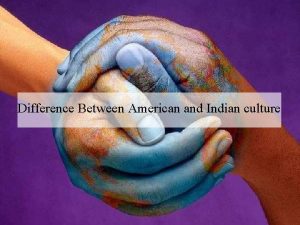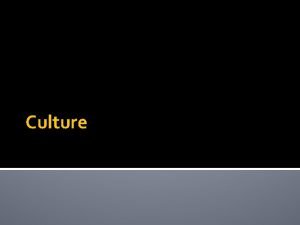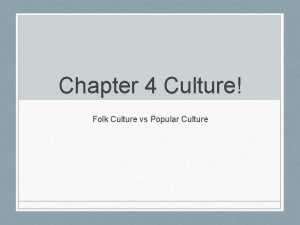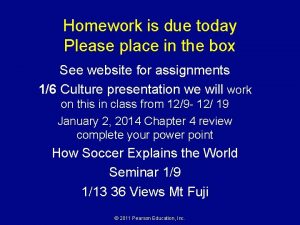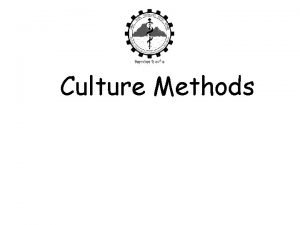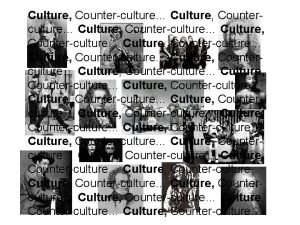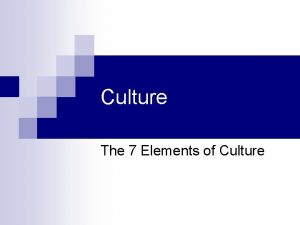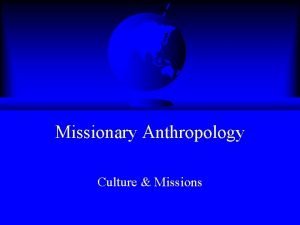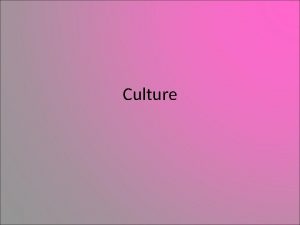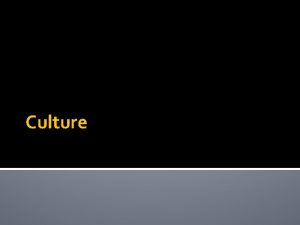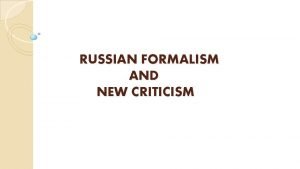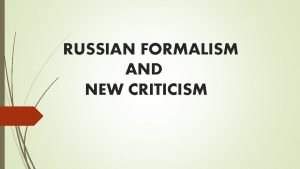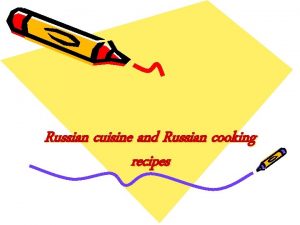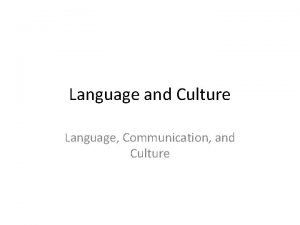Russian Language and Culture 2 Russian language Russian










- Slides: 10

Russian Language and Culture 2. Russian language / русский язык

Russian Language Русский язык Russian uses a different alphabet, but it’s not as difficult to read as you might think: • Some of the letters are the same as English ones. • Russian is phonetic – so each letter represents one sound. So, once you recognise the letters, you can read aloud in Russian and a Russian person will understand you • Some words are the same in Russian as in English. Let’s learn how to: • read some of the Russian letters • greet someone in Russian • say which sports you like and don’t like This Photo by Unknown Author is licensed under CC BY-NC-ND

There are 33 letters in the Russian alphabet. Let’s learn to read some of them… Letters in disguise! They look like Letters that don’t look Letters that look like English letters and sound like them too. English letters but sound different. like English letters at all! • Аа • Ее • Кк • Мм • Оо • Тт sounds like ah • Вв sounds like very sounds like yellow • Нн sounds like net sounds like kettle • Рр sounds like red sounds like man • Сс sounds like snow sounds like offer • Уу sounds like boom sounds like tiger • Хх sounds like ha! • Бб • Гг • Ии • Лл • Пп • Фф • Шш sounds like ball sounds like goal sounds like meet sounds like love sounds like pot sounds like foot sounds like shoe


Russian names Александр Иванович Гончаров Russians have three parts to their name: first name, patronymic and surname. The patronymic is formed by adding an ending to their father’s fist name. A boy would add an ending such as -ovich. A girl would add an ending such as –ovna. Alexandr Ivanovitch Goncharov is my full name, but hardly anyone ever uses it. I normally only ever see it written down on official documents. Nearly everyone calls me Sasha. I have a girl cousin, Alexandra, who also gets called Sasha by everyone. It’s very confusing at family parties! Саша We haven’t learnt all the Russian letters that appear on this page, but which ones do you recognise? Could you match up the Russian names with the versions in English letters if they were jumbled up? What clues would you use to help you? Саш! ‘Sash!’ is what my friends shout when they want to get my attention. I hear this a lot when we are playing icehockey! Sashenka is what my mum calls me. It’s a bit like saying ‘sweet little Sasha’ in English. It was OK when I was younger but now I find it really embarrassing! Сашенька

What’s your name? Hi! Привет! (Preevyet) Как дела? (Kak dyela? ) Хорошо, спасибо (Horosho, spaseebo) Good, thanks! Как тебя зовут? (Kak tebya zovoot? ) Меня зовут Коля (Myenya zovoot Kolya) What’s your name? How are you? Good! How are you? Хорошо! (Horosho!) Как дела? (Kak dela? ) My name is Ira. What’s your name? My name is Kolya. Меня зовут Ира. (Myenya zovoot Eera. ) Как тебя зовут? (Kak tyebya zovoot? ) Read this dialogue out loud with a partner. Can you guess what the Russian means?

I like… I don’t like… A couple more letters for you to learn: Юю Яя sounds like you Я люблю баскетбол sounds like yak I like = я люблю I don’t like tennis! I like basketball (ya lyooblyoo) I don’t like = я не люблю (ya nye lyooblyoo) Я не люблю теннис! Now it’s your turn! Tell your partner which sports you like and don’t like… in Russian! Which sport does Ira like and which one doesn’t she like?

Did you know… • The Russian alphabet is called the Cyrillic alphabet. Some other languages, such as Serbian and Ukrainian, use it too. • ‘Cyrillic’ is named after St Cyril – one of the two Greek monks who travelled to Russia and invented Russian’s writing system. • About 288 million people speak Russian. • About 65, 000 people in the UK speak Russian as one of their main languages. • Russia is such a large country that surely there must be lots of different dialects and accents. No! In the north of Russia, ‘o’ is pronounced more like an ‘a’ and that’s the only big difference. Once you can speak Russian, you can understand be understood by anyone else who speaks it. • Russian is also spoken in many other countries, such as Uzbekistan, Belarus, Latvia, Kazakhstan, Ukraine, Lithuania, Azerbaijan. Moldova and Estonia.

Keen to find out more? Is there anyone in your school or local community who speaks Russian? Say привет to them next time you see them! Maybe they could teach you some more Russian. Find a copy of the full Russian alphabet with the sounds explained in English. You could write a secret message - English words in Russian letters – and ask your friends to decode it. Russian people love going on holiday where it’s warm. If you ever go to Turkey, Spain or Cyprus, listen out for anyone speaking Russian. Have a look on the back of food packets – if there is information written in many languages, you might find Russian there. Can you recognise any of the letters? Try learning some Russian using an app such as Duolingo or a book such as ‘Russian Script Hacking’.

More information Russian language and culture offers an introduction to Russia for young people and their teachers. Videos in this series: 1. Introduction to Russia 2. Russian language 3. 1000 years of Russian history 4. Ideas for books to read 5. Russia and Space 6. Daily life in Russia Have a look at the Education Pack which accompanies these slides, providing background information and ideas on all the topics covered. For children aged 7 -11 there is a special version of the Education Pack adapted by the British Council. Download from: www. russianinscotland. com Questions or comments? russianinscotland@gmail. com
 Example of pop culture
Example of pop culture Continuous culture and batch culture
Continuous culture and batch culture Indian vs american culture
Indian vs american culture Uses of selenite f broth
Uses of selenite f broth Folk culture and popular culture venn diagram
Folk culture and popular culture venn diagram What is folk culture
What is folk culture Anaerobic medium
Anaerobic medium Folk culture and popular culture venn diagram
Folk culture and popular culture venn diagram Anaerobic culture method
Anaerobic culture method Lawn or carpet culture
Lawn or carpet culture Surface culture deep culture and esol
Surface culture deep culture and esol


